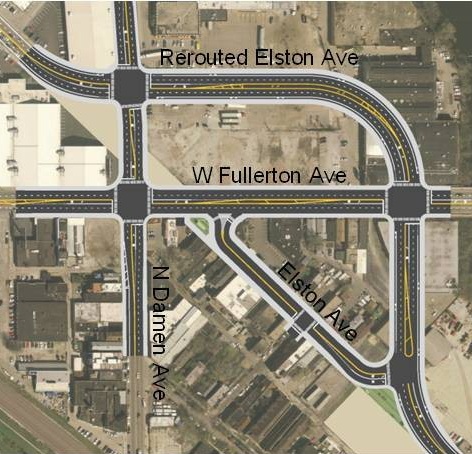City Announces Ambitious Transportation Plan
By Chuck Sudo in News on May 11, 2012 2:00PM
The Chicago Department of Transportation unveiled a two-year, wide-ranging transportation plan yesterday that covers everything from pothole repair to increasing access trips to O'Hare and Midway Airports. (The 100-page report can be read here, as a PDF file.)
The main priority of the plan is safety, according to Transportation Commissioner Gabe Klein, with a goal of eliminating all pedestrian, bicycle and overall traffic crash fatalities within 10 years.
You read that right. Klein believes it's possible.
“Some people might look at that and say, ‘Is that a realistic goal?’ We spent a lot of time thinking about that and we absolutely think it’s a realistic goal,” Klein said.
To accomplish that goal, the city plan on installing countdown pedestrian signals at 300 intersections this year and, funding permitting, another 100 next year; alter stoplights at 100 intersections this year to give pedestrians an extra three seconds to cross the street; and fill all potholes before the next winter starts and set a goal of filling reported potholes within 72 hours.
Other projects the plan calls to address include:
- Replacing the Lake Michigan shoreline retaining wall from 43rd to 45th Streets, Montrose to Irving Park Road and at Fullerton Avenue by the Theatre on the Lake.
- Reconfiguring the accident-prone Damen-Elston-Fullerton intersection on the North Side.
- Tearing down the 60s-era roadway overpasses on Western over Belmont and on Ashland over Pershing. They would be replaced with “attractive, modernized” intersections.
- Reconstructing the historic Torrence Avenue vertical lift bridge over the Calumet River and rebuilding the Wells Street Bridge over the Chicago River.
- Rehabbing existing bike lanes and add 10 more miles of bike lanes each year, plus creating up to 100 miles of protected bikeways by 2015.
All this is going to cost money, and the plan calls for more funding for these projects on the federal and state levels, and the city plans to establish an enterprise fund to support transportation needs. Two-thirds of the gas tax revenues in Illinois come from Chicago, but the city receives less than half of those for transportation improvements.
Klein said plans are in the works to give residents regular progress reports, including establishing an online progress dashboard to chart the pothole patching. “We’re going to be honest and let people know, and we’ll also be setting new goals as we finish the ones we’ve planned,” Klein said.
